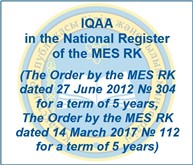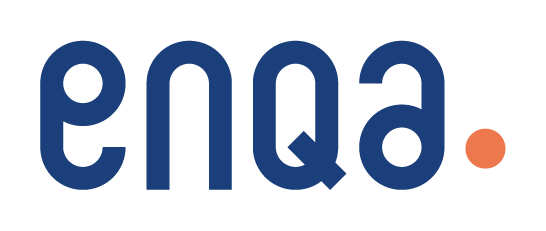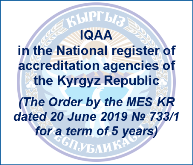Regulations

Regulations on the Accreditation Council The IQAA Accreditation Council is a public collegial body in charge of decision-making on accreditation. In addition, within its competence it provides consultation to the Agency and conducts its activities in line with these Regulations. The Regulations on the Accreditation Council have been developed in accordance with the Law on Education of the Republic of Kazakhstan dated July 27, 2007 (as amended on November 05, 2014), order of the Minister of Education and Science of the Republic of Kazakhstan No. 556 dated December 30, 2011 “On the formation of the national registers of accreditation bodies, accredited organizations and study programmes” and international practices. The Accreditation Council carries out its activities in accordance with the Standards and Guidelines for Quality Assurance in the European Higher Education Area, the standards for external quality assurance of IQAA, approved by the order No.8/1 dated September 25, 2014, normative and legal documents of the Ministry of Education and Science of the Republic of Kazakhstan, the Statute and normative documents of IQAA. Here you can find Regulations on the Accreditation Council. |
Provision on decision-making of the IQAA Accreditation Council concerning institutional accreditation of higher education institutions The decision-making process of the IQAA Accreditation Council is based on the experiences of European accreditation agencies and follows a standard algorithm of the evaluative judgments. A higher education institution can receive a certain number of points for each standard, which will further determine the final decision of the Accreditation Council regarding the accreditation of the educational institution. Based on the results of the decision-making process, a higher education institution can be granted one of the following status: accredited, accredited with conditions, and unaccredited. Here you can find Provision on decision-making of the IQAA Accreditation Council concerning institutional accreditation of higher education institutions. |
Provision on decision-making of the IQAA Accreditation Council concerning accreditation of study programmes The decision-making process of the IQAA Accreditation Council is based on the experiences of European accreditation agencies and follows a standard algorithm of the evaluative judgments. A study programme can receive a certain number of points for each standard, which will further determine the final decision of the Accreditation Council regarding the accreditation of the study programme. Based on the results of the decision-making process, a study programme can be granted one of the following status: accredited, accredited with conditions, and unaccredited. Here you can find Provision on decision-making of the IQAA Accreditation Council concerning accreditation of study programmes. |
Regulations on the Accreditation Committees The IQAA Accreditation Committee is a collegial body, representing experts of institutional accreditation and experts of programme accreditation by groups of specialties (programmes). A Committee constitutes an IQAA subdivision, which ensures assistance in conducting an expert assessment of self-evaluation reports and agreement of expert groups for external reviews. The Regulations on the Accreditation Committees set out credentials, procedure of formation and organization of activity of the IQAA Accreditation Committees. The Regulations are an internal document of the Independent Kazakh Agency for Quality Assurance in Education, developed on the basis of the Law of the Republic of Kazakhstan “On Education”, the IQAA Statute and Provision on the Agency. Here you can find Regulations on the Accreditation Committees. |
Regulations on the Procedure of Considering Complaints Independent Kazakh Agency for Quality Assurance in Education acts in accordance with principles of transparency and accountability, outlined in the IQAA Strategy. This suggests the presence of clear and published procedures of reacting to complaints of educational institutions, which do not agree with remarks and recommendations of external expert groups. A complaint means expression of dissatisfaction of higher education institutions, which have undertaken institutional or programme accreditation, with the quality of service or actions of an IQAA coordinator or IQAA external expert group members. The Agency has a separate complaints procedure. Considering complaints of educational institutions helps to detect violations made during an external review and suggest recommendations for their elimination. Considering complaints allows controlling and evaluating the efficiency of procedures used, maintaining openness and responsibility of the Agency staff, and constitutes a part of the Strategy aimed at improving quality of work of IQAA and its expert groups. Here you can find Regulations on the Procedure of Considering Complaints. |
Regulations on the Appeals Commission and the Procedure of Appeal The Appeals Commission considers an appeal of an educational institution against a decision on institutional or specialized accreditation, which was made by the Accreditation Council. The decision on the appeal is taken according to these Regulations. The Appeals Commission accepts an appeal of an educational institution against the following issues: - Violation of the accreditation procedure; - "Factological errors" - this means that the information provided by an educational institution was used incorrectly by the Accreditation Council, and therefore it led to a negative decision. Here you can find Regulations on the Appeals Commission and the Procedure of Appeal. |
The Code of Honor for IQAA employees The Code of Honor for IQAA employees establishes main standards of behavior and business communication of an IQAA employee in accordance with generally accepted moral and ethical principles and norms. Participation in accreditation of educational organizations is an expression of special trust from educational organizations and IQAA and it places high demands on morality and ethical image of the IQAA staff. IQAA employees voluntarily agree to follow the principles, norms and rules of business communication and behavior established by the Code. Here you can find The Code of Honor for IQAA employees. |
The Code of Honor for Accreditation experts The Code of Honor for an expert of institutional and/or specialized (programme) accreditation of educational organizations of the Republic of Kazakhstan sets general standards of conduct according to generally accepted moral and ethical norms. Participation in accreditation of educational organizations is an expression of special trust from the side of educational institutions and the Independent Kazakh Agency for Quality Assurance in Education (IQAA), and it places high requirements on morality and moral and ethical image of experts. Here you can find The Code of Honor for Accreditation experts. |
The Code of Honor for a member of the IQAA Accreditation Council The Code of Honor for a member of the IQAA Accreditation Council sets general standards of conduct for a member of the IQAA Accreditation Council according to generally accepted moral and ethical norms. Participation in the work of the Accreditation Council is an expression of special trust from the side of educational institutions of the Republic of Kazakhstan and the Independent Kazakh Quality Assurance Agency in Education (IQAA), and it places high requirements on morality and moral and ethical image of Accreditation Council members. Here you can find The Code of Honor for a member of the IQAA Accreditation Council. |
Internal Quality Assurance Policy The Internal Quality Assurance Policy is aimed at describing and structuring the mechanisms of internal quality assurance of the activities of Independent Kazakh Quality Assurance Agency in Education (IQAA). The Policy should be considered in connection with other normative documents of IQAA and is obligatory for compliance by all IQAA staff. The Policy defines interaction of all elements of the Agency’s internal quality assurance system, while distribution of responsibilities within the processes is regulated by the relevant normative documents of IQAA. IQAA places the same high quality demands on its own work as placed on educational institutions under review, experts and other participants of the accreditation cycle procedures. Establishment of its own internal quality assurance system reflects the IQAA’s willingness and readiness to improve its activities, developing its own quality culture. Here you can find Internal Quality Assurance Policy . |
Regulations on Post-Accreditation Monitoring These regulations are developed in accordance with the standards of institutional / specialized accreditation of the Independent Kazakh Agency for Quality Assurance in Education for higher education institutions, research institutions and TVET organizations and define the Agency’s procedures and rules on post-accreditation monitoring of accredited (accredited with a condition) educational institutions and/or study programmes. Here you can find Regulations on Post-Accreditation Monitoring. |















